'Altered Carbon’ is more than just a 'Blade Runner’ ripoff
Written by Devindra Hardawar
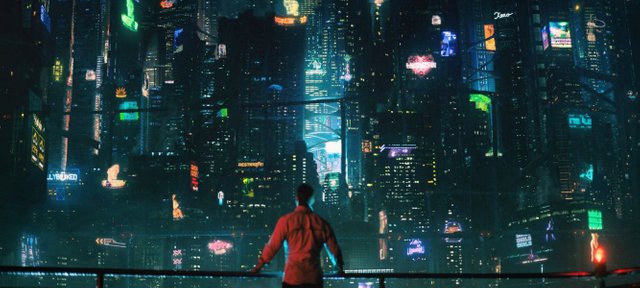
Image credit: Katie Yu/Netflix
'Altered Carbon’ is more than just a 'Blade Runner’ ripoff
It's an excessive, but intriguing, exploration of digital consciousness.
Altered Carbon is the very definition of a guilty pleasure. The show, adapted by Laeta Kalogridis from Richard Morgan's novel, isn't exactly well written. And, like most Netflix joints, it goes on for way too long. But it's gorgeous, it's filled with charismatic actors and its cyberpunk aesthetic feels like a '90s anime brought to life. (That's a good thing—to me, at least.) Altered Carbon is simply a lot of fun. And while it owes an obvious debt to Blade Runner, I was surprised that underneath the ultraviolence and gratuitous Cinemax-esque sex scenes, it's also an intriguing exploration of where digital consciousness could take us.
In Altered Carbon, death is obsolete. Physical bodies are merely containers, or "sleeves," used for hosting "cortical stacks," futuristic storage devices that hold your memories and consciousness. If your body dies, your stack (assuming it hasn't been destroyed) can easily be moved over to a different sleeve. They plug into slots at the back of your neck, in a nod to the Matrix.
While this new technology is certainly miraculous, it also introduces an entirely new set of social issues. Anyone technically can be immortal, but only the rich have access to high-quality bodies, while everyone else has to make do with what they can afford. If you're poor, a hospital might just stick you into an old and decrepit sleeve. The richest of the rich, or Meths (a shortened reference to Methuselah, from the Bible), naturally end up living the longest. They've built a paradise in huge skyscrapers above the clouds, far above the rain- and smog-filled surface world.
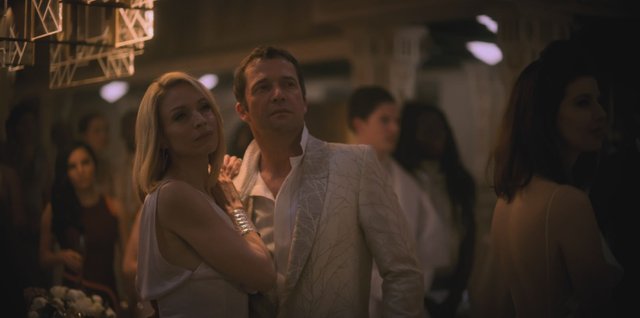
Humans being humans, the introduction of practical immortality also means that the rich inevitably end up with more power and influence than before. We're introduced to the world through the eyes of Takeshi Kovacs, a former rebel who's awakened, 250 years after his last sleeve died, in a new body (played by Joel Kinnaman). It turns out one of the very wealthy, Laurens Bancroft (James Purefoy), needs help solving his own murder. Trippy, I know. At that point, we see yet another advantage of the super-rich. Bancroft can actually back up his consciousness to a secure satellite, which means it isn't game over if his stack is destroyed. Going a step further, he can also download himself into clones of his original body. Voilà: true immortality.
In Blade Runner, we explored our humanity through cyborgs with limited lifespans. Blade Runner 2049 went even deeper, giving us a cyborg lead who might be more human than he thinks. I didn't expect Altered Carbon to add much to the conversation, but its rendering of a world where humans no longer fear death seems just as meaningful. Futurists like Ray Kurzweil theorize that we'll eventually be able to upload our consciousness to computers, which would grant us a sort of digital immortality. Of course, doing so requires us to fully understand how our minds work, which we're nowhere near grasping yet.
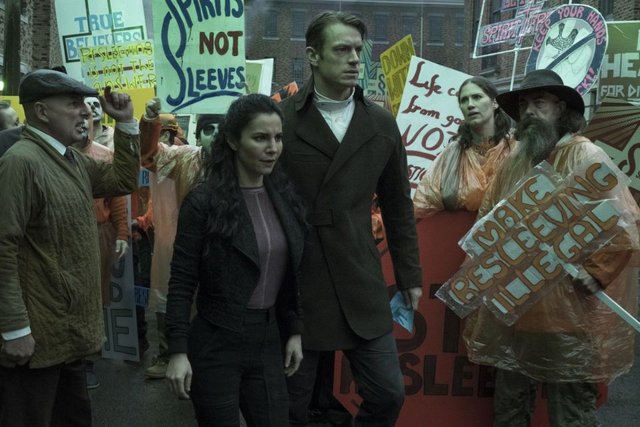
Naturally, not everyone is cool with the idea of living forever. Religious groups in Altered Carbon consider the practice unholy, and their followers opt out of having their stacks rebooted. The show brings up the obvious counterpoint: Couldn't something as astounding as living forever be considered a miracle? Unfortunately, it doesn't spend much time delving much deeper.
For something so rooted in questions of identity, it's a shame that Altered Carbon doesn't have much to say about obvious representation issues in its narrative. We're introduced to Kovacs in his original Asian body, but he never comments on being rebooted into the body of a white man. Still, at least we get a decent chunk of time with Kovacs' two Asian sleeves, played by Byron Mann and Will Yun Lee, and the show has a diverse supporting cast as well. From what I've read, the show also seems to do a better job of focusing on Kovacs' Asian bodies than the book does. The issue is certainly less egregious than the whitewashing controversy in the recent Ghost in the Shell remake.
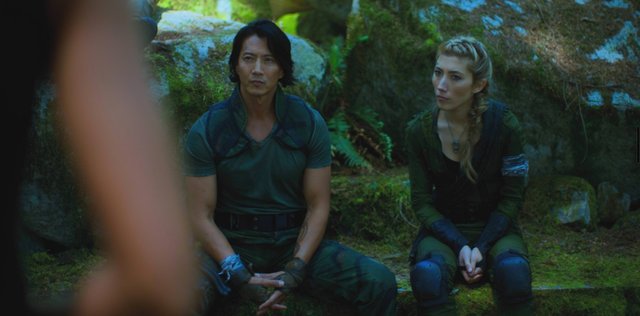
If this sort of body swapping were actually possible, you can be sure there'd be philosophical explorations about what it means to hop into the shoes of other races and genders. The show gives us glimpses—we see a young girl who ends up being rebooted into the body of an old woman, and a grandmother who finds herself in the body of a tattooed gangster bro. But there's definitely room for more nuance in future seasons.
Altered Carbon's take on VR is, not surprisingly, reminiscent of The Matrix. Since your consciousness is fully digitized, you end up perceiving virtual worlds just as realistically as the physical world. That opens up entirely new avenues for guilt-free adult recreation, but it also means you can actually get hurt in VR. Virtual torture ends up being as effective as the real thing—even more so, since you could go through the experience of being killed over and over. VR could also be seen as a form of prison for any conscious being. One subplot in the show involves a character who goes through the trauma of being killed and whose digital psyche ends up being broken in the process.
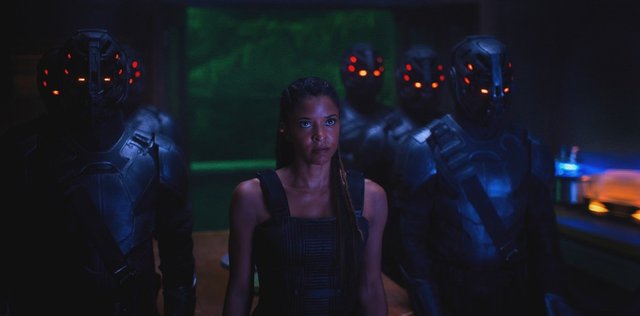
While I didn't expect much from Altered Carbon at first, the show ultimately won me over. It's cyberpunk in the truest sense—it's a dirty, sometimes excessive exploration of technology's impact on society. It's no work of art, like the Blade Runner films. But it will make you think amid the mayhem.
Not close to blade runner at all. There are no androids hiding between humans. It is a police novel as any other (that is not blade runner's special feature) ... I have no idea why you suggest that. Perhaps no experience with sci fi
Had to wrestle myself through a few episodes to get immersed in the setting but felt the 'binge' soon afterward.
Great review. This one is next on my list to watch. Netflix is dominating the Dojo!
It's a shame we have not seen a screen adaptation of "Neuromancer". Still one of my favorite cyberpunk Era book and 90s Pc video game. We are coming closer and closer to that reality it seems.
Screen adaptation of Neuromancer? Now we're talking
If you never had the pleasure/pain of playing the 1988 version of "Neuromancer" I would recommend checking it out, since I believe it's floating around. At one point I believe Willieam Gibson did sell the movie rights and it was going to be produced, but I think it got squashed before it made it far. As closest we came I think was "Johnny Mnmonic" in 1995, as I hoped if that did well we would see "Neuromancer" be green lit. Check out the PC gameplay below:
Hold the Deck! (see what I did there?) - It looks like mention of last year of a possible of Neuromancer making it to the big screen! - http://deadline.com/2017/08/deadpool-tim-miller-neuromancer-william-gibson-movie-fox-simon-kinberg-1202145496/
I SEE SOME RED EYES PERSONS IN THE PIC 4. Are they robots?
I'm 9 episodes in and I'm quite hooked to the show, although as you said its a bit long and feels sorta Game of Thronish in the sense that you get tired after watching two, max three episodes. What I love most about the series is the way they really pass on to the viewer the feeling that the human body means nothing, everyone who isn't rich has loads of scars everywhere and don't seem to care at all about damaging their "sleeves". As for the rich, Bancroft even completely smashes one of his clones just to make a point. After watching this for several hours I emerge wondering if I shouldn't just not care about anything since if I die I will just get rebooted. A weird feeling to say the least. But anyhow, the writing can be improved indeed but this is a show above par and I agreed with pretty much everything you described. Good review!
I felt like I was the only person who got into this. I got in 2 1/2 episodes last night and it just keeps getting better. There is so much to follow to understand it all, but it's engaging and once you figure it all out it is a really great story/plot. Excited to see how it all pans out.